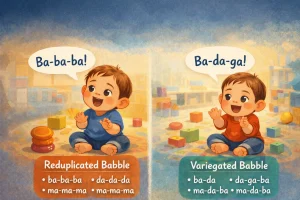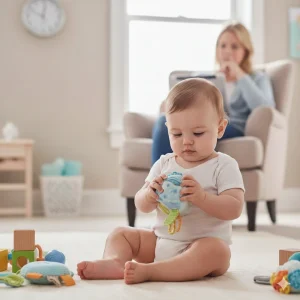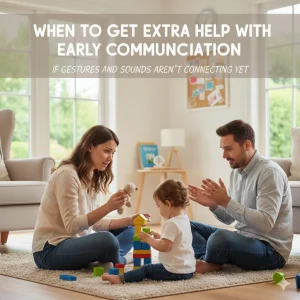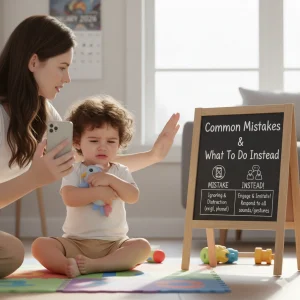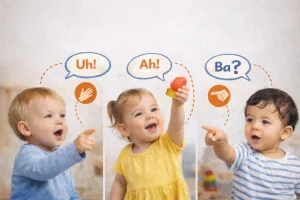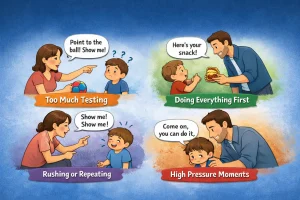Why My Toddler Talks in a Robotic Tone — Should I Be Worried?
By Wellness Hub
Last Updated: July 24, 2025
Does your toddler speak in a flat, emotionless voice — almost like a little robot? You’re not alone, and it’s a concern many parents share. When a toddler talks in a robotic tone, it can sound monotone, scripted, or lacking natural emotion. While this might simply be a phase as your child learns to use tone and expression, in some cases, it could point to a speech delay or a developmental issue like autism or social communication difficulties. Understanding the signs early can help you decide whether it’s just a temporary stage or if professional support might be needed.
Free Speech Help for Kids
Concerned about speech delays? Book a free consultation with our expert speech therapist and get guidance tailored to your child’s needs.
What Does It Mean When a Toddler Talks in a Robotic Tone?
If your toddler’s voice sounds stiff, flat, or emotionless — like a little robot — you might feel confused or even a bit worried. You’re not alone. Many parents notice something sounds “off” in their child’s speech but aren’t sure what it means. Let’s break it down in simple terms.
What is a Robotic Tone in Toddler Speech?
A robotic tone means your child is speaking without natural changes in pitch, emotion, or rhythm. It might sound:
- Monotone (all words sound the same)
- Flat (no highs or lows in the voice)
- Emotionless (no feeling behind the words)
Imagine someone saying, “I love you” in the same tone as “I dropped my toy” — no excitement, no sadness, just the same voice all the time. That’s what flat speech in toddlers might look like.
Signs Your Toddler’s Speech Sounds Unnatural
Every toddler is different, but here are a few things to listen for:
- Words sound mechanical or repetitive
- No change in tone when asking a question
- Little to no emotion in their voice
- Same rhythm in every sentence (almost like a script)
This doesn’t always mean something is wrong — some toddlers are still learning how to use their voice expressively.
Why It Happens
There are many possible reasons for robotic-sounding speech:
- Your child may just be copying phrases they’ve heard
- They might not yet understand how to match tone with feeling
- Or it could be an early sign of speech delay or social communication difficulties
If the speech sounds unnatural for their age and doesn’t improve over time, it’s worth exploring more.
When to Watch Closely
Pay attention if your toddler:
- Has limited back-and-forth conversation
- Uses unusual or scripted phrases
- Rarely shows emotion in their voice
- Is not reaching typical speech milestones
These may be early signs of a communication challenge like autism spectrum disorder or expressive language delay.
Is It Normal for Toddlers to Have a Flat or Monotone Voice?
It’s a question many parents ask — and it’s completely valid. If your toddler speaks in a flat or monotone voice, you might wonder if it’s just a phase or something more. The good news? Sometimes, it is a normal part of learning how to talk.
Understanding Early Speech Development
When toddlers first start talking, their main goal is to get the words out — not necessarily to sound expressive or emotional. At this early stage, they may not yet understand or use intonation (the rise and fall in our voice when we speak). Their speech may come out sounding:
- Flat or even-toned
- Choppy or robotic
- Lacking the natural rhythm adults use
This is especially common when a toddler is just starting to combine words or copy longer sentences they’ve heard before. Their speech melody, or how their voice rises and falls, is still developing.
When to Consider It a Red Flag
While many toddlers outgrow flat speech as they gain confidence, there are times when it may be a sign of something more.
Here’s when you may want to look more closely:
- Your toddler’s speech never changes tone — it’s always flat, no matter the situation
- They don’t show emotion in their voice, even when excited or upset
- They often speak in repetitive or scripted ways
- They rarely use back-and-forth conversation or respond to your tone
- Other communication delays are present, such as limited gestures, no pretend play, or minimal eye contact
These signs could point to speech rhythm issues, delays in intonation development, or be part of a broader communication challenge such as autism or social-pragmatic communication disorder.
What Causes Robotic Speech in Toddlers?
If your toddler’s voice sounds robotic, flat, or emotionless, it’s normal to feel a bit confused or concerned. While all children develop speech differently, there are some common reasons a toddler might talk in a robotic-sounding tone. Understanding these causes can help you decide what steps to take next — whether it’s gentle support at home or talking to a speech therapist.
Possible Reasons for Robotic-Sounding Speech in Toddlers
1. Autism Spectrum Disorder (ASD)
Many children on the autism spectrum speak in a flat or robotic tone. They may also repeat phrases (echolalia), avoid eye contact, or have trouble using gestures. This kind of flat prosody in toddlers is often one of the early signs of ASD. But not all children with robotic speech have autism — and not all children with autism talk this way.
2. Delayed Speech or Language Development
Some toddlers experience general speech delay, which can affect how their voice sounds. They may speak with little expression, struggle to put words together, or avoid talking altogether. This might make their speech sound mechanical or emotionless.
3. Hearing Issues
If a child can’t clearly hear sounds or voices, they may not learn to match tone, pitch, or emotion in speech. Undetected hearing loss — even mild — can lead to robotic-sounding speech or delayed responses.
4. Imitative or Scripted Speech
Some toddlers copy lines from cartoons, rhymes, or YouTube videos word-for-word. This is called scripted or echo speech. It often sounds unnatural or robotic because the child is repeating without understanding tone or meaning. This can be common in children with or without developmental delays.
5. Emotional or Neurological Conditions
In some cases, children with neurological or emotional differences may speak with a flat voice due to difficulty controlling tone or expressing emotion. Early evaluation helps rule out or identify such issues, and targeted support can help improve natural speech over time.
| Possible Cause | What to Look For | What You Can Do |
|---|---|---|
| Autism Spectrum Disorder | Flat tone, echolalia, lack of eye contact | Consider early autism screening |
| Speech delay | Limited vocabulary, robotic tone | Try home strategies; seek therapy |
| Hearing problems | Not responding to sounds, unclear speech | Get a pediatric hearing check |
| Scripted speech | Repeats shows or phrases exactly | Use more expressive real-time talk |
| Neurological/emotional factors | Little emotion, slow speech development | Ask for a full speech evaluation |
Is Robotic Speech a Sign of Autism in Toddlers?
Hearing your toddler speak in a robotic or flat tone can raise questions — especially around autism. One of the early signs of ASD (Autism Spectrum Disorder) can be unusual speech patterns, including monotone or emotionless speech. But it’s important to remember: not all robotic speech means autism.
What Makes Speech Sound “Autistic”?
Some toddlers on the autism spectrum may:
- Speak in a flat or robotic voice
- Repeat words or phrases exactly (called echolalia)
- Use unusual pitch or rhythm in their speech
This happens because children with autism often process language differently. They may focus more on words than how they sound emotionally. So yes, robotic speech can be one sign of autism, especially when seen with other behaviors.
But Every Child is Different
Some toddlers talk this way simply because they’re:
- Still learning how to use tone and feeling in speech
- Copying what they hear on TV or devices
- Experiencing speech delay without any other concern
That’s why it’s important to look at the whole picture — not just speech tone alone.
Watch for These Other Signs of Autism in Toddler Speech:
| Possible Speech Sign | What It Might Suggest |
|---|---|
| Repeating the same words over and over | Possible echolalia (common in ASD) |
| Flat, emotionless voice | A sign of difficulty with expressive speech |
| No back-and-forth conversation | Trouble with social communication |
| Not responding when name is called | Could point to sensory or developmental delay |
| Limited use of gestures or facial expression | A social communication red flag |
Should I Worry About My Toddler’s Speech Tone?
If your child sounds like a robot when they talk — using the same tone all the time or lacking emotion — it’s normal to feel concerned. But here’s the good news: not all speech tone issues in toddlers mean something serious.
Some children naturally take longer to learn how to change their pitch or add feeling to their words. So in many cases, it’s just part of learning to talk. Still, it helps to know when to worry about toddler speech and when to simply keep supporting at home.
When to Wait and Watch
It’s okay to keep observing if your child:
- Is still under 2.5 years old
- Just started using words or short phrases
- Changes tone sometimes during play or stories
- Responds when you talk to them and makes eye contact
These signs usually mean your toddler is still learning and improving.
When to Seek Help
But some tone issues may need a closer look. Consider talking to a speech therapist if your child:
- Always speaks in a flat or robotic tone
- Doesn’t change voice for questions or feelings
- Shows no progress in tone or expression over several months
- Has trouble with social interaction or back-and-forth talk
- Sounds very different from other kids their age
What Can Parents Do at Home to Help?
If your toddler is talking in a robotic or flat tone, don’t worry — there’s a lot you can gently do at home to help them speak more naturally. These small, everyday actions can make a big difference in how your child learns to express emotion and tone in their voice.
Also read: Essential Parenting Tips for Effective At-Home Speech Therapy
Here are a few simple ways to support your toddler’s speech at home:
1. Model Natural Speech with Emotion
Children learn a lot by listening to the way you speak. Use a lively, expressive tone when you talk — whether you’re playing, reading, or even brushing teeth.
Instead of saying, “Time to eat,” try:
“Yay! Let’s eat something yummy!”
Let your face show emotions too — happy, surprised, excited — so your child connects how words sound with how we feel.
2. Use Songs and Expressive Play
Songs are great for building rhythm and tone. Singing simple rhymes or action songs like “Wheels on the Bus” helps toddlers vary their pitch and volume.
Try pretend play too — give voices to toys and act out fun scenes. It encourages your child to copy different speech patterns and emotions.
Know more about our article on Benefits of Using Music and Songs to Boost Speech Articulation
Example Activities Table
| Activity | What It Helps With |
|---|---|
| Singing rhymes | Intonation, pitch, memory |
| Pretend play | Expressive language, social skills |
| Animal sounds | Vocal variety and fun engagement |
| Puppet talk | Back-and-forth conversation style |
3. Encourage Back-and-Forth Conversation
Even if your toddler only says a few words, talk to them like they understand everything. Then pause and wait for a response — a look, a sound, or a word.
Example:
You: “Do you want the red ball or the blue one?”
(Pause and wait…)
Your toddler: “Red!”
This turn-taking builds the rhythm of real conversation and helps them develop natural speech flow.
4. Read Books with Different Voices
Reading picture books daily is one of the best speech boosters. But don’t just read — act it out!
Use silly voices, whispers, or dramatic tones for each character. This makes it fun and shows your child how words can sound different depending on feelings.
Bonus Tip: Choose books with repeating lines or rhyming patterns. They’re easier to remember and copy!
Support When You Need It
If you’re noticing ongoing challenges or feel unsure, you’re not alone. Many parents turn to professional guidance to understand if their toddler’s speech tone needs extra help.
At Wellness Hub, our expert team offers speech therapy for toddlers at home, online, or in-person — with child-friendly, goal-based support. We focus on making speech feel natural and fun, right from the start.
When to See a Speech Therapist for Robotic Speech
It’s natural to wonder whether your toddler’s robotic or flat speech tone is just a phase — or something that needs professional support. Every child develops at their own pace, but some signs can mean it’s time to talk to a speech therapist for toddlers.
If your toddler’s speech lacks emotion, sounds unnatural, or hasn’t changed much over several months, getting a professional opinion can offer both answers and peace of mind.
Signs You Should Consider a Speech Evaluation for Your Toddler
Here are some red flags that suggest your child might benefit from a speech and language assessment:
Speech Tone & Expression:
- Talks in a monotone voice or with little emotion
- Sounds robotic or overly scripted in how they speak
- Doesn’t vary pitch when asking questions or showing excitement
General Communication Delays:
- Doesn’t combine words by 2.5 years
- Uses very few words or only repeats what they hear (echolalia)
- Avoids speaking even when they understand
Social & Interaction Cues:
- Rarely makes eye contact while speaking
- Struggles with back-and-forth conversation
- Shows limited interest in communicating with others
Quick Reference Table
| Concern Observed | Possible Meaning | Action Step |
|---|---|---|
| Robotic or monotone speech | May need help with intonation | Book a speech evaluation |
| No change in tone despite exposure | Could be a red flag for developmental concerns | Talk to a speech therapist |
| Flat voice + limited social interaction | Might signal ASD or related challenges | Seek early professional guidance |
Why Early Evaluation Matters
The earlier a speech therapist can assess your child, the sooner they can offer support tailored to your toddler’s needs. Sometimes, all that’s needed is a little coaching. Other times, early signs can point to conditions like speech delay, autism spectrum disorder, or expressive language challenges — and addressing them early makes a big difference, it’s best to get a speech evaluation for kids from a professional.
You don’t need to wait for a formal diagnosis or for someone else to raise concerns. As a parent, your instincts matter. If you’re feeling unsure, trust that it’s okay to ask for help.
Where to Get Help
At Wellness Hub, we offer gentle, play-based speech therapy for toddlers — online and offline — designed to support kids with robotic speech, monotone tone, or delayed communication. Our licensed therapists work closely with families to guide early development with compassion and care.
We also provide quick, easy-to-book speech evaluations for kids so you can understand your child’s needs clearly and confidently.
Support – Trusted by Thousands of Indian Families
If you’re feeling unsure about your toddler’s robotic speech or tone, you’re not alone. Many parents across India have asked the same questions — and found comfort, guidance, and real progress through Wellness Hub.
At Wellness Hub, we understand how confusing it can be when your child’s speech doesn’t sound the way you expected. That’s why we offer speech therapy tailored to your toddler’s needs, including help for those who speak in a flat or robotic tone, have delayed speech, or may show early signs of autism.
Why Parents Trust Us
- Expert Guidance: Our certified speech-language therapists specialize in early childhood communication.
- Convenient Access: Choose online help for toddler speech issues from the comfort of your home.
- Child-Friendly Approach: Therapy is playful, engaging, and personalized — never stressful.
- Trusted Nationwide: We’re proud to be a go-to platform for autism and speech support in India, with thousands of families turning to us each year.
Conclusion
Every toddler is different, and that includes how they talk. If your child’s speech sounds flat or robotic, try not to worry — but don’t wait either. Early support can really help. Many speech tone issues are easy to improve with the right guidance. At Wellness Hub, we offer friendly, expert-led speech therapy for toddlers to help your child speak more naturally. Whether it’s for robotic speech or delayed talking, we’re here to support you. Explore our speech therapy programs today and take the first step toward better communication for your little one.
Frequently Asked Questions:
1. Why does my toddler sound robotic when they talk?
Some toddlers talk in a robotic or flat tone because they’re still learning how to use voice, pitch, and emotion in speech. It could also be a sign of speech delay, autism, or hearing issues. If it continues, it’s a good idea to talk to a speech therapist.
2. Is it normal for toddlers to have a flat or monotone voice?
Sometimes it’s normal, especially if your toddler is just starting to talk. But if your child shows no change in speech tone over time, or doesn’t show emotion while speaking, it could mean they need extra speech support.
3. Can robotic speech be a sign of autism in toddlers?
Yes, it can be one possible sign. Many children with autism speak in a flat, repetitive, or robotic tone. If your toddler also shows signs like poor eye contact or limited social interaction, consider getting an early autism screening.
4. When should I be worried about my toddler’s speech tone?
If your toddler:
- Always talks in the same tone
- Doesn’t show feelings through voice
- Speaks in a way that sounds unnatural
then it’s best to get a speech evaluation for kids from a professional.
5. What causes flat or robotic speech in toddlers?
Common causes include:
- Delayed speech development
- Autism spectrum disorder
- Hearing problems
- Copying speech from shows or videos
Speech tone issues can improve with early speech therapy.
6. How can I help my toddler speak more naturally at home?
You can:
- Use expressive voice when you talk
- Sing songs with different pitches
- Play pretend with different character voices
- Read books using fun tones
These help improve intonation and speech rhythm.
7. Do all kids with robotic speech need therapy?
Not always, but many do benefit from it. A speech therapist for toddlers can check if your child needs support and guide you with home activities or regular sessions.
8. Can online speech therapy help with monotone speech?
Yes! At Wellness Hub, we offer online help for toddler speech issues, including flat or robotic speech. Therapy sessions are fun, engaging, and easy to access from home.
9. What happens during a speech evaluation for a toddler?
A speech therapist will:
- Observe how your child speaks and listens
- Ask you questions about development
- Play simple games to check tone, words, and expression
This helps find the right support plan for your child.
10. Where can I find trusted speech therapy in India?
Wellness Hub is trusted by thousands of Indian families. We offer speech therapy for toddlers, early autism support, and parent guidance — both online and offline.
About the Author:
Rajini Darugupally
M.Sc., Speech-Language Pathologist (9+ years of experience)
Rajini is a passionate and dedicated Speech-Language Pathologist with over 9+ years of experience, specializing in both developmental speech and language disorders in children and rehabilitation in adults. Driven by a desire to empower each individual to find their voice, Rajini brings a wealth of experience and a warm, genuine approach to therapy. Currently, at Wellness Hub, she thrives in a team environment that values innovation, compassion, and achieving results for their clients.
Book your Free Consultation Today
Parent/Caregiver Info:
Client’s Details:
* Error Message
